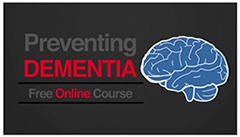Online Course Gives Guidance on How to Lower Dementia Risk
Quick Links
Starting in July, a massive open online course (MOOC) will translate recent population-based findings into practical advice on how individual people might lower their risk of dementia. Called “Preventing Dementia,” the course will summarize factors reported to increase risk, such as hypertension and diabetes, and protective factors such as education and physical activity. The course targets an audience of health professionals, elder care service providers, policy makers, and anyone else interested in brain health.

“There is a desperate need for evidence-based knowledge in this area, especially with the increasing numbers of people with dementia and greater profile of the condition in society,” James Vickers, University of Tasmania, wrote to Alzforum. In 2013, he and colleagues at the Wicking Dementia Research and Education Centre created the popular MOOC “Understanding Dementia.” That course covers the brain, how dementia affects it, and approaches to care. Over four runs, 70,000 people from 170 countries enrolled and logged a completion rate of 38 percent, four times higher than MOOCs typically achieve, according to Vickers. Since 2013, platforms such as Coursera and FutureLearn have offered MOOCs on various aspects of dementia, including patient care, behavior management, and understanding rare forms (see the new Alzforum page MOOCs on Dementia and Feb 2016 news).
Over the course of five weeks, people taking “Preventing Dementia” will hear from scientists at the University of Tasmania and other investigators in the field, including Kaarin Anstey from the Australian National University, Carol Brayne from the University of Cambridge, U.K., and Nicola Lautenschlager from the University of Melbourne. These researchers will share insights from epidemiological studies and offer advice for how a person can try to forestall disease or slow its progression (Norton et al., 2014). Instructors will also summarize current research initiatives that aim to figure out how to lower risk.
The course is designed so students can interact with one another and assess their own risk. Participants can contribute to research assessing their knowledge about dementia, attitudes toward risk, and change in risk over time. Since enrollment began on June 1, up to 300 people have been signing up each day, Vickers said.
“Preventing Dementia” starts July 12 and runs through August 22. Enrollment is here.—Gwyneth Dickey Zakaib
Media
References
Basic page Citations
News Citations
Paper Citations
- Norton S, Matthews FE, Barnes DE, Yaffe K, Brayne C. Potential for primary prevention of Alzheimer's disease: an analysis of population-based data. Lancet Neurol. 2014 Aug;13(8):788-94. PubMed.
External Citations
Further Reading
Papers
- Richard E, Jongstra S, Soininen H, Brayne C, Moll van Charante EP, Meiller Y, van der Groep B, Beishuizen CR, Mangialasche F, Barbera M, Ngandu T, Coley N, Guillemont J, Savy S, Dijkgraaf MG, Peters RJ, van Gool WA, Kivipelto M, Andrieu S. Healthy Ageing Through Internet Counselling in the Elderly: the HATICE randomised controlled trial for the prevention of cardiovascular disease and cognitive impairment. BMJ Open. 2016 Jun 10;6(6):e010806. PubMed.
- Sindi S, Mangialasche F, Kivipelto M. Advances in the prevention of Alzheimer's Disease. F1000Prime Rep. 2015;7:50. Epub 2015 May 12 PubMed.
- Lista S, Dubois B, Hampel H. Paths to Alzheimer's disease prevention: from modifiable risk factors to biomarker enrichment strategies. J Nutr Health Aging. 2015 Feb;19(2):154-63. PubMed.
Annotate
To make an annotation you must Login or Register.

Comments
No Available Comments
Make a Comment
To make a comment you must login or register.